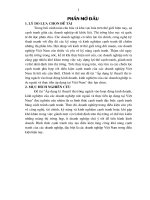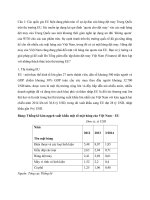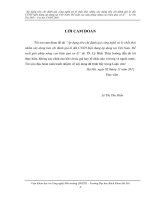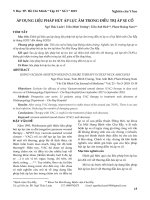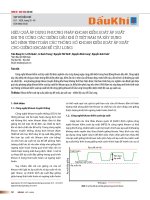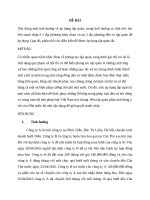Áp dụng những kĩ thuật kịch để tăng sự ghi nhớ từ vựng cho học sinh khối lớp 10 ở một trường THPT ở tỉnh vĩnh phúc
Bạn đang xem bản rút gọn của tài liệu. Xem và tải ngay bản đầy đủ của tài liệu tại đây (7.82 MB, 144 trang )
VIETNAM NATIONAL UNIVERSITY, HANOI
UNIVERSITY OF LANGUAGES & INTERNATIONAL STUDIES
FACULTY OF POST- GRADUATE STUDIES
------
NGUYỄN THỊ THANH PHƢƠNG
DEPLOYING DRAMA-BASED TECHNIQUES TO ENHANCE
VOCABULARY RETENTION FOR THE TENTH GRADERS
AT A HIGH SCHOOL IN VINH PHUC PROVINCE
Áp dụng những kĩ thuật kịch để tăng sự ghi nhớ từ vựng
cho học sinh khối lớp 10 ở một trƣờng THPT ở tỉnh Vĩnh Phúc
M.A. MINOR PROGRAM THESIS
Field: English Teaching Methodology
Code: 8140231.01
Hanoi-2021
1
VIETNAM NATIONAL UNIVERSITY, HANOI
UNIVERSITY OF LANGUAGES & INTERNATIONAL STUDIES
FACULTY OF POST- GRADUATE STUDIES
------
NGUYỄN THỊ THANH PHƢƠNG
DEPLOYING DRAMA-BASED TECHNIQUES TO ENHANCE
VOCABULARY RETENTION FOR THE TENTH GRADERS
AT A HIGH SCHOOL IN VINH PHUC PROVINCE
Áp dụng những kĩ thuật kịch để tăng sự ghi nhớ từ vựng
cho học sinh khối lớp 10 ở một trƣờng THPT ở tỉnh Vĩnh Phúc
M.A. MINOR PROGRAM THESIS
Field: English Teaching Methodology
Code: 8140231.01
Supervisor: Dr. Huỳnh Anh Tuấn
Hanoi-2021
2
DECLARATION
I hereby certify the thesis entitled: “Deploying drama-based techniques to enhance
vocabulary retention for the tenth graders at a high school in Vinh Phuc province” is
the result of my own research for the Degree of Master at the University of lngauges
and International Studies, Vietnam National University, and thesis has not been
submitted for any other degrees.
Hanoi, May 2021
Students’ signature
Nguyễn Thị Thanh Phƣơng
i
ACKNOWLEDGEMENTS
To begin with, I would like to send my profound gratitude to my supervisor, Dr.
Huynh Anh Tuan for his detailed and precise guidance and tremendous support.
I would also like to express my gratefulness to all my lecturers at the Faculty of
Post Graduate Studies, University of Languages and International Studies for their
valuable lectures which have helped me a great deal in gaining a lot of theoretical as
well as practical knowledge.
I am also thankful to all the extention officers, Principals and teachers of the high
school inVinh Phuc province for their precious guidance and suggestions to fulfill the
objectives of this study.
Additionally, my special thanks to 35 tenth graders who have helped me
enthusiastically in English lessons by using drama activities to improve their
vocabulary retention.
My grateful thanks are also extended to Ms. Doan Thi Thanh Loan and Ms.
Tran Thi Thu Ha, two of my colleagues at the high school, who supported me in
assessing the vocabulary tests.
I would be glad to thank my family members without whose uncondtional
support this task would not have been accomplished.
Finally I wish to thank everyone who directly or indirectly helped me in this
endeavor.
ii
ABSTRACT
Drama-based techniques have been assumed to potentially offer an enjoyable
way to help students improve their vocabulary retention (Giebert, 2014). This research
aimed at investigating the enhancement of the tenth graders‟ vocabulary retention
through the researcher‟s deployment of drama-based techniques, the students‟ opinions
and attitudes towards the use of drama-based techniques to improve their vocabulary
retention and the difficulties the students encountered during the learning experience.
The study was conducted as an action research project with a group of 35 tenth graders
from an intact class at a high school in Vinh Phuc province for 11 weeks. The study
utilized both qualitative and quantitative methods to analyze the data collected from
vocabulary tests, questionnaires, students‟ self-evaluation checklists and students‟
reflections. Findings from the tests and student reflections revealed that drama- based
techniques made significant contribution to the enhancement of the students‟
vocabulary retention. The data obtained from the questionnaires, student selfevaluation checklists and student reflections indicated that the students had optimistic
opinions towards and positive attitudes their vocabulary retention through the teacher‟s
deployment of drama-based techniques. The participants also divulged that they
encountered a number of difficulties during the learning experience.
Keywords: vocabulary retention, drama-based techniques, tenth graders, action
research, opinions, attitudes, difficulties
iii
TABLE OF CONTENTS
DECLARATION .............................................................................................................i
ACKNOWLEDGEMENTS ...........................................................................................ii
ABSTRACT .................................................................................................................. iii
TABLE OF CONTENTS ..............................................................................................iv
LIST OF FIGURES, CHARTS AND TABLES ...................................................... viii
CHAPTER I: INTRODUCTION ................................................................................. 1
1.1. Rationale of the study................................................................................................ 1
1.2. Aims and objectives of the study .............................................................................. 2
1.3. Research questions .................................................................................................... 2
1.4. Significance of the study ........................................................................................... 2
1.5. Scope of the study ..................................................................................................... 3
1.6. Research methods...................................................................................................... 3
1.7. Structure of the thesis ................................................................................................ 3
CHAPTER II: LITERATURE REVIEW.................................................................... 5
2.1. Vocabulary retention ................................................................................................. 5
2.1.1 Definition of vocabulary ...................................................................................... 5
2.1.2. The importance of vocabulary and vocabulary learning .................................... 5
2.1.3. Dimensions of vocabulary knowledge................................................................. 6
2.1.4. Vocabulary learning strategies ........................................................................... 7
2.1.5. Vocabulary teaching strategies ........................................................................... 8
2.1.6. Vocabulary retention and memory ...................................................................... 8
2.2. Drama-based techniques ........................................................................................... 9
2.2.1. Definition of drama ............................................................................................. 9
2.2.2. The benefits of using drama-based techniques in vocabulary lessons ............. 10
iv
2.2.3. Disadvantages of using drama-based techniques in vocabulary lessons ......... 11
2.2.4. Classification of drama-based techniques ........................................................ 12
2.3. Overview of related studies ..................................................................................... 13
2.4. Summary ................................................................................................................. 16
CHAPTER III: METHODOLOGY ........................................................................... 17
3.1. Restatement of the research questions .................................................................... 17
3.2. Reasons of choosing action research ...................................................................... 18
3.3. The setting of the research ...................................................................................... 19
3.3.1. Research site ..................................................................................................... 19
3.3.2. English textbooks .............................................................................................. 19
3.4. The participants ....................................................................................................... 19
3.4.1. Students ............................................................................................................. 19
3.4.2. Teachers ............................................................................................................ 20
3.5. Research method ..................................................................................................... 20
3.6. Research procedure ................................................................................................. 22
3.7. Data collection instruments ..................................................................................... 25
3.7.1. Vocabulary tests ................................................................................................ 25
3.7.2. Questionnaires .................................................................................................. 26
3.7.3. Student self- evaluation checklists .................................................................... 28
3.7.4. Student reflections ............................................................................................. 28
3.8. Data analysis ........................................................................................................... 29
3.9. Summary ................................................................................................................. 35
CHAPTER IV: FINDINGS AND DISCUSSIONS ................................................... 36
4.1. The enhancement of the students‟ vocabulary retention through the teacher‟s
deployment of drama-based techniques ......................................................................... 36
v
4.1.1. The comparison of pre-test scores and post-test scores in stage 1 ................... 36
4.1.2. The comparison of pre-test scores and post-test scores in stage 2 ................... 37
4.1.3. The comparison of the scores of all vocabulary tests ....................................... 38
4.1.4. Analysis of 4 questions in the student reflections in term of the effectiveness of
the teacher’s deployment of drama-based techniques on vocabulary retention............ 40
4.2. The students‟ opinions on and attitudes towards their vocabulary learning
experiences through the teacher‟s deployment of drama-based techniques .................. 41
4.2.1. The students’ opinions on the effect of the teacher’s deployment of dramabased techniques on their vocabulary retention ......................................................... 42
4.2.1.1. Analysis of two questions in the questionnaires ........................................ 42
4.2.1.2. Analysis of 4 questions in the student self-evaluation checklists ................ 43
4.2.1.3. Analysis of 2 questions in the student reflections ....................................... 44
4.2.2. The students’ opinions on and attitudes towards psychological and social
benefits of the teacher’s deployment of drama-based techniques to teach vocabulary . 45
4.3. The difficulties the students encountered during the vocabulary learning
experience with the teacher‟s deployment of drama-based techniques ......................... 49
4.4. Discussions .............................................................................................................. 54
4.4.1. The effect of the teacher’s deployment of drama-based techniques on the
students’ vocabulary retention ....................................................................................... 54
4.4.2. The students’ opinions and attitudes towards their vocabulary learning
through the teacher’s deployment of drama-based techniques ..................................... 55
4.4.3. The students’ difficulties during the process of learning vocabulary through the
teacher’ deployment of drama-based techniques........................................................... 57
4.5. Summary ................................................................................................................. 58
CHAPTER V: CONCLUSION ................................................................................... 59
5.1. Recapitulation ......................................................................................................... 59
5.2. Implications of the study ......................................................................................... 60
vi
5.2.1. For English teachers ......................................................................................... 60
5.2.2. For students ....................................................................................................... 61
5.3. Limitations of the study .......................................................................................... 61
5.4. Suggestions of further study.................................................................................... 62
REFERENCES ............................................................................................................. 63
APPENDICES ................................................................................................................ I
APPENDIX 1: THE PROCEDURE OF THE STUDY ................................................... I
APPENDIX 2: DRAMA SCRIPTS ...............................................................................IV
DRAMA SCRIPT FOR TOPIC 1: GENDER DISCRIMINATION (prepared by the
teacher) ...........................................................................................................................IV
DRAMA SCRIPT FOR TOPIC 2: WEDDINGS (prepared by the teacher) .................. V
DRAMA SCRIPTS WRITTEN BY STUDENTS: ........................................................VI
APPENDIX 3: A LESSON PLAN ................................................................................. X
APPENDIX 4: VOCABULARY PRE-TEST .............................................................XIV
APPENDIX 5: VOCABULARY POST-TEST 1 .................................................... XVIII
APPENDIX 6: VOCABULARY POST-TEST 2 ..................................................... XXII
APPENDIX 7: VOCABULARY DELAYED POST-TEST ................................... XXVI
APPENDIX 8: TEST SCORES ................................................................................ XXX
APPENDIX 9: QUESTIONNAIRE (English and Vietnames version) ................... XXXI
THE STUDENTS‟ RESPONSES IN QUESTIONNAIRES RELATED TO THEIR
DIFFICULTIES THEY ENCOUNTERED DURING THE INTERVENTION XXXVII
APPENDIX 10: STUDENT SELF-EVALUATION CHECKLIST ........................... XLI
APPENDIX 11: STUDENT REFLECTIONS .......................................................... XLV
TWO STUDENT REFLECTIONS COLLECTED ................................................ XLIX
vii
LIST OF FIGURES, CHARTS AND TABLES
LIST OF FIGURES
Figure 1. The Ice Cream Cone Model (devised by Brown hill, 2017)……….. ……..17
Figure 2. Cycle of Classroom Action Research adapted from Kemmis, Mc Taggart….
and Nixon (2014)………………………………………………………………..........21
Figure 3. Data analysis of the study …………………………………………………..29
LIST OF TABLES
Table 1. Group of language learning strategies the Likert scale in the questionnaires..27
Table 2: Themes and codes of all qualitative data……………………………………32
Table 3. The comparison of means and standard deviation between the scores of pretest and post-test 1……………………………………………………………………..36
Table 4. The comparison of paired differences between the scores of pre-test and posttest
1………………………………………………………………………………………..37
Table 5. The comparison of means and standard deviation between the scores of pretest and post-test 2…………………………………………………………………......37
Table 6. The comparison of paired differences between post-test 2 scores and pre-test
scores…………………………………………………………………………….…….38
Table 7. Number of new words the students learned in each stage………………….40
Table 8. The students‟ opinions on and attitudes towards psychological and social
benefits of the teacher‟s deployment of drama-based techniques reported in the
questionnaires …………………………………………………………………………46
Table 9. The students‟ opinions on and attitudes towards psychological and social
benefits of the teacher‟s deployment of drama-based techniques reported in the student
self-evaluation checklists ………………………………………………….………….47
viii
Table 10. The difficulties related to the teacher‟s instructions verified by the students
in the checklists ……………………………………………………………………….49
Table 11. The difficulties derived from the student‟s personal weaknesses and negative
psychology in the checklists…………………………………………………………...51
Table 12. The students‟ difficulties related to time constraint in the checklists………53
LIST OF CHARTS
Chart 1. Comparison of mean of all vocabulary test scores…………………………39
Chart 2. The students‟ revealing of reasons why lessons with drama-based techniques
enhanced their vocabulary retention………………………………………………..…42
Chart 3. Students‟ opinion on the enhancement of vocabulary retention through dramabased techniques…………………………………………………………………...…..42
Chart 4. The students‟ opinions on the effect of the teacher‟s deployment of dramabased techniques on vocabulary retention……………………………………………43
ix
CHAPTER I: INTRODUCTION
This part presents the rationale for choosing the topic, the aims and objectives of
the study, the research questions, the scope, the research methods, the significance and
the design of the study, and the structure of the thesis to help readers have a general
view on the research.
1.1. Rationale of the study
Harmon and Wood (2008) indicate that vocabulary knowledge may be
considered as an indicator of success in foreign language acquisition. In the recognition
of the crucial role of vocabulary mastering in language acquisition, exploring effective
ways to enhance students‟ vocabulary acquisition and retention have been first priority
in language teaching.
Vocabulary learning through drama-based instructions, as one type of
memorable learning experiences, is an effective approach to feasibly acquire
vocabulary knowledge (Giebert, 2014). According to Moore (2004), vocabulary
learning through drama-based techniques is a practical strategy to make connections
among learners‟ past experiences, the vocabulary knowledge currently being studied,
and new vocabulary. Students are exposed to new vocabulary by discussing and using
it in real context through carefully- designed drama-based activities.
There have been some studies on the implementation of using drama activities
such as Janudom and Wasanasomsithi, (2009); Demircioğlu (2010); and Early and
Young (2009), but most of them focused on the effectiveness of drama techniques on
learners‟ speaking skills. Some studies were conducted to investigate the effectiveness
of using dramas in vocabulary teaching lessons, but just in the context of tertiary
institutions or primary English classes.
Not many studies investigated on the effect of this teaching technique on
vocabulary retention. Most of them used experiment study or case study. It is evident
that there has been little research on the effectiveness of role play and simulation on the
vocabulary retention of high school students. Besides, action research is a very
effective way of allowing teachers to reflect on interesting or problematic areas of their
own teaching in a well-organized way and come up with efficient ways to improve
1
their teaching practice (Wallace, 1998). Because of these reasons, the researcher
selected action research to conduct this study with the hope of improving her own
teaching practices and her institution.
1.2. Aims and objectives of the study
The study aims at investigating the effectiveness of the researcher‟s deployment
of drama-based techniques on the students‟ vocabulary retention.
According to the aim, the researcher points out some main objectives of the
study as follows:
- explore the extent the tenth graders in a high school in Vinh Phuc province
enhance their vocabulary retention through the researcher‟s deployment of
drama-based techniques
- figure out their opinions on and attitudes towards the use of these techniques
- investigate difficulties the students encountered during the process of the
teacher‟s application to teach vocabulary
1.3. Research questions
The following three research questions are formulated to achieve the aim and
objectives mentioned above:
(1) To what extent does the teacher’s deployment of drama-based techniques enhance
vocabulary retention among the students?
(2) What are the students’ opinions and attitudes towards their vocabulary learning
experiences through drama-based techniques?
(3) What are the difficulties the students encountered during the vocabulary learning
process through the teacher’s deployment of drama-based techniques?
1.4. Significance of the study
This study should be of potential interest to language learners who desire to
improve their vocabulary retention. It helps the learners acknowledge the effectiveness
of drama-based techniques on vocabulary retention. In addition, the study clarifies the
vocabulary teaching technique with the detailed account of the application of dramabased techniques. Finally, the researcher wishes to have this study become a reliable
2
and updated source for other fellow researchers who have developed an interest in
drama-based techniques in relation with vocabulary retention.
1.5. Scope of the study
The study focuses on the application of drama-based techniques, including
simulation and role play, in vocabulary teaching. The study is carried out as an action
research project in English lessons to tenth-graders at a high school in Vinh Phuc
province in the second term of the school year of 2020-2021. Concerning the scope of
the study, the following issues should be taken into consideration. First, the study
explored the enhancement of students‟ vocabulary retention through the intervention.
Secondly, the focus of the investigation was on students‟ opinions and attitudes, and
their difficulties during the learning experience.
1.6. Research methods
The study was undertaken as an action research project of a two- stage cycle on
the implementation of simulation and role play, which was integrated as homeassigned tasks in the pre-existing syllabus of the class. The study employed both
qualitative and quantitative methods. Data were collected through the analysis of
vocabulary tests, questionnaires, student self-evaluation checklists and student
reflections. The data obtained from vocabulary tests and the reflection were compared
using paired sample T-test to measure the magnitudes of the effects caused by dramabased activities on students‟ vocabulary retention. The data collected from
questionnaires, student self-evaluation checklists and student reflections were utilized
to reveal the participants‟ opinions and attitudes towards the use of drama -based
techniques to improve their vocabulary retention and identify several impediments
which the students had during the learning experience.
1.7. Structure of the thesis
The thesis comprises five main chapters: (1) Introduction, (2) Literature review,
(3) Methodology, (4) Findings and discussions (5) Conclusion, followed by the List of
References and Appendices.
Chapter 1: Introduction
3
This chapter sketches the overall picture of the whole study. The rationale, aims
and objectives, significance, research questions, scope and methods of the research are
presented. In general, the Introduction serves as an overview of this study.
Chapter 2: Literature review
In this chapter, key terms such as vocabulary, vocabulary retention, drama,
drama-based techniques, simulation and role play were explained. Furthermore, the
critical reviews of the related studies are conducted.
Chapter 3: Methodology
The chapter provides the methodology to carry out the study. Specifically, the
research procedure was demonstrated in details through each stage. The research
methods, research design, settings, the participants, data collection instruments and
data analysis were also justified.
Chapter 4: Findings and discussions
After data collection process, the findings from the data were presented in this
chapter. These data are analyzed thoroughly to answer the research questions. The
chapter consists of findings and discussion of the study which provides the detailed
outcome of the data analysis procedure.
Chapter 5: Conclusion
This final chapter summarizes the results from all analyzes of the prior sections
as well as provides some recommendations for further research. Besides, the possibility
of limitations is also recognized in relation to the outcomes of this study and the
pedagogical recommendations of the study were also offered.
4
CHAPTER II: LITERATURE REVIEW
This chapter mainly focuses on the theoretical background of the study and also
the brief review of related studies. Key terms such as vocabulary teaching strategies,
vocabulary retention, drama-based techniques and so on were explained clearly.
2.1. Vocabulary retention
2.1.1 Definition of vocabulary
From different perspectives, it is much more complicated to define vocabulary,
so agreement on the notion of vocabulary seems to be difficult to reach.
According to Neuman and Dwyer (2009), the definition of vocabulary includes
words we must know to communicate effectively; words in speaking (expressive
vocabulary) and words in listening (receptive vocabulary) are identified. Ur (1996)
prefers vocabulary to be defined as the items, not just single words, we teach in the
foreign language. An item of vocabulary can be either a sing word or two or three
words, for example father-in-law and post office which express a single idea. In
addition, Barcroft, Sunderman, and Schmitt (2011) holds the view that vocabulary
includes lexical chunks, phrases of two or more words, such as Good morning and
Nice to meet you because it is learned as single lexical units.
In short, the term vocabulary is defined in different ways by various researchers.
The study is on the agreement that the term vocabulary is the total number of words of
a language, single words, phrases or chunks of several words that serves as a useful
tool for communicating ideas and expressing a particular meaning (Hornby, 1995).
2.1.2. The importance of vocabulary and vocabulary learning
Among various aspects of language system such as pronunciation, syntax,
discourse, vocabulary is of the most importance (Folse, 2004). According to Wilkins
(1972, p. 111), “without grammar very little can be conveyed; without vocabulary,
nothing can be conveyed”. Wallace (1982) also approved of the primary importance of
learning vocabulary which is considered as the basis for acquiring a language. Candlin
(1988, p. vii) stated that “… the study of vocabulary is at the heart of language
5
teaching in terms of organization of syllabuses, the evaluation of learner performance,
and the provision of learning resources….”
From the above perspectives, it is the researcher‟s acknowledgement that
vocabulary learning plays a significant role in language acquisition. Vocabulary
development is tied to the achievements of a foreign language learning student in
schools (Wallace, 1982). Vocabulary size reveals learners‟ ability to learn to read, to
access to new information, to think and learn about the world, and to perform them in
that language.
2.1.3. Dimensions of vocabulary knowledge
Various views have been presented by scholars in the domain of vocabulary
knowledge dimensions.
According to Nation (1990) and Richards (1976), vocabulary can be categorised
into two broad items of knowledge: vocabulary breadth and vocabulary depth. In other
words, how many words one knows and how well one knows those words are two
main dimensions of vocabulary words. Henriksen (1999), who argues that in order to
truly know a word, the learners must have ability to make deliberate connections
between the target words and other words they know. It means that learners must be
well aware of semantic network of the target words and must know morphological,
syntactic and collocational dimensions of those words. According to Schneider, Healy,
and Bourne (2002), vocabulary is composed of four constituents: (1) the ability to
pronounce or spell, (2) the ability to differentiate one word from another, (3) the ability
to connect L2 words with their L1, and (4) the ability to perceive the equivalence of L2
and L1. In other words, vocabulary knowledge refers to various dimensions such as:
word pronunciation and spelling, word formation, lexical field, word families,
synonym, antonym, word combination, homonymy, hyponymy, denotation and
connotation.
All in all, the author of the current study is in favor of the idea that knowing a
word means being able to recognize the spoken form of the word and
pronounce, spell and write the word and use the word in appropriate situations (Nation,
2000).
6
2.1.4. Vocabulary learning strategies
It is helpful to keep in mind several vocabulary learning strategies that help the
researcher determine which strategy is effective for her students.
According to Oxford (1990), there are two types of vocabulary learning
strategies including direct strategies and indirect strategies. Direct strategies consist of
strategies related to cognition, memory and compensation whereas indirect strategies
give various support for learning process through “focusing, planning, evaluating,
seeking opportunities, controlling anxiety, increasing cooperation and empathy and
other means (Oxford, 1990, p.151). Schmitt (1997) argues that using dictionary, verbal
and written repetition, learning spelling, guessing meaning from context, discussing
with peers to find out meaning are the most frequently used vocabulary learning
strategies. Gu (2003) gave a list of diverse strategies for vocabulary learning, including
the task-dependent strategies of learning from context, dictionary use, vocabulary notetaking, rote rehearsal, encoding, word formation, semantic networks and vocabulary in
use. O‟Malley and Chamot (1990) classified language learning strategies into four
major
strategies:
metacognitive,
cognitive,
social
and
affective
strategies.
Metacognitive strategies are used to plan for learning and thinking about the process of
learning a language. Cognitive strategies refer to ones related to the manipulation of
different learning techniques and the evaluation about the learning process. Social
strategies mainly involve the learners‟ communicative interaction with others.
Affective strategies include the strategies in relation to emotional issues.
In short, the researcher is in agreement with the ideas of Oxford (1996) about
indirect and direct vocabulary learning strategies. Learner may learn vocabulary either
incidentally from contextual experiences or intentionally from effective instructions.
The process of vocabulary is incremental. In other words, learners learn words bit by
bit through being exposed to words. The deployment of drama-based techniques in
teaching vocabulary may improve vocabulary learning in an indirect way and increase
the exposure of the students to target words.
7
2.1.5. Vocabulary teaching strategies
Different vocabulary teaching strategies which help learners increase and retain
words more effectively have been proposed by various studies on vocabulary
acquisitions.
According to Folse (2004), writing a list of words with their meanings and then
getting students to copy them down is one of widespread-used strategies for teaching
vocabulary. Students are often required to complete a variety of exercises on those
words in their textbooks. Laufer, Meara and Nation (2005) concur with Bourke (2011)
about the importance of repetition and frequent vocabulary practice. According to these
researchers, any kinds of teaching techniques, which encourage learners‟ engagement
in vocabulary, are successful. According to Krashen (1989), extensive reading gives
students opportunities to infer the unknown words in specific contexts and thus learn
their meanings and retain more words. Vocabulary is learned more effectively through
implicit reading or explicit instruction (Nation, 2001).
To sum up, there have been a number of vocabulary teaching strategies, each of
which has both benefits and drawbacks. The researcher in this study would like to
apply drama-based project which stimulates students to be engaged with more words,
then learn and retain more vocabulary.
2.1.6. Vocabulary retention and memory
There are many studies conducted on the issue of memory and vocabulary
retention and their relation.
Simply, according to Yali (2010), vocabulary retention can be defined as the
ability of recalling and using a new word in the appropriate context after a given period
of time. What‟s more, Yali (2010) asserts that better retention and a considerable depth
of vocabulary knowledge than may result from a combination of incidental learning, or
reading text, and intentional vocabulary learning through specific explicit vocabulary
exercises.
Memory has a significant influence on vocabulary learning and achievement
(Amiryousefi & Ketabi, 2011).
Zhang (2004) divides memory into three types:
8
sensory memory, short-term memory, and long-term memory. He indicates that longterm memory is the one that lasts from an hour to a lifetime (Zhang, 2004). The
transference of the information stored in the sensory memory and short-term memory
to long-term memory can occur if sufficient time, appropriate attention and frequent
rehearsal of the information are reassured (Mayer, 2014). Additionally, new
information can be incorporated into long-term memory if there is an association
between new information with the old one.
Basing on the previous studies, the researcher agrees that vocabulary retention
refers to “the ability of recalling or remembering things after an interval of time”
(Richards & Schmidt, 2002, p. 457). In other words, vocabulary retention is the ability
of providing the meaning of new words or phrases after a given period of time. In order
to transfer vocabulary knowledge effectively from short-term memory to long-term
memory, learners need to treat the words actively rather than passively, and interact
with the words in meaningful ways (Schmitt, 2000).
2.2. Drama-based techniques
2.2.1. Definition of drama
In terms of language teaching, drama is a term that attracts various attentions of
researchers.
According to Via (1987), drama refers to communication among people that
convey meaning. In drama practice, students are responsible for transforming the text
of a drama into actions, dialogues or sights. Besides, the notion of drama is associated
with the idea of the pretence context in which learners are required to project
themselves in a certain imaginative way into another situation, in or outside the
classroom (Holden, 1981). Maley and Duff‟s (1984) hold the view that dramatic
activities in the language classroom are not the performance of plays before audiences,
but for activities to develop language competence and imagination.
In short, the researcher defines drama as a series of oral performance that
requires creativity, imagination and simulation from students in language classrooms in
order to improve their language knowledge (Hubbard et al., 1986). It is a
9
communicative activity where the students “are asked either to portray themselves or to
portray someone else in an imaginary situation" (Holden, 1982, p. 14).
2.2.2. The benefits of using drama-based techniques in vocabulary lessons
Drama has been considered as a valuable and efficient tool to learn a language
for decades (Dougill, 1987). A variety of benefits of using drama techniques in
vocabulary lessons have been identified by many authors.
Drama-based techniques intensively provide memorable events and meaningful
contexts (Martin, 1993) as well as repeated exposure to the word (Laufer, Meara, &
Nation, 2005) that vocabulary learning retention requires. Owens and Barber (1998)
states that drama attracts students‟ attention a lot since they are allowed to leave their
seat deliberately and get involved in different real-life situations. Language skills are
also assisted in the process of teaching English with drama (Clipson-Boyles, 1998).
Performing drama means communicating meaning by speaking and listening in the
target language and it creates processes related to writing and reading.
Rosalind (2012) has proposed ten powerful benefits of using drama in the
English as foreign language classroom, one of which is to create a memorable context
that enhances vocabulary learning and retention.
Besides, Boudreault (2010) recapitulates that drama approach in language
teaching offers nine benefits, including: (1) the smooth interaction in the target
language; (2) the improvement of understanding pronunciation and prosody features in
a contextualized situation; (3) the acquisition of new fully contextualized vocabulary
and structures; (4) the improvement of students‟ confidence in their ability to learn the
target language; (5) the development of students‟ imagination; (6) a chance to increase
independent thinking skills; (7) practice in critical thinking ways; (8) the enhancement
of cooperative skills and social understanding and (9) the relief from tensions in
language learning environment.
Additionally, Sam (1990) concluded that different kinds of drama activities such
as role-play and communication games help the extension, the retention and the
reinforcement in learning vocabulary and sentence structure. Various forms of drama
activities require not only physical but also intellectual and emotional involvement of
10
individuals which create a memorable learning experience. Rew and Moon (2013)
investigates the use of scripted play- a kind of drama activities and summarizes four
benefits of deploying drama in language class: (1) an effective way to learn specific
English expressions; (2) similar benefits of both male and female students in term of
sense of emotion; (3) the usefulness for both students with high and low English
proficiency; and (4) the increasing ability to use the expressions learned in drama in
different situations.
According to many researchers such as Martin (1993), Demircioglu (2010),
Janudon (2009), and Laufer, Meara, and Nation (2005), drama activities can be
considered as a teaching technique to promote long-term retention of vocabulary
because the variety of drama activities provides memorable events, meaningful context
as well as repeated exposure to the word which vocabulary retention requires.
In short, several current empirical studies also proved the benefits of using
drama in vocabulary lessons. The author of this study see the point of employing drama
activities in the classroom as the learning experience provides the students with
valuable opportunity to learn target language by doing, acting, performing and
experiencing rather than merely passive listening and writing (Dougill, 1987). The
researcher believes that during drama performance and after-acting discussions,
students are given chance to practice target words in a natural context. the researcher is
in favor of the conclusion presented by John, D (1987) that drama activities can assist
to provide visual, intellectual, emotional and physical reinforcement that improve
participations and also help to attach the vocabulary items in long-term memory. In
other words, drama requires spoken or written language and uses objects, gestures,
sounds and images to convey meaning. Motivation and confidence might be improved
during the employment of drama as a teaching technique for it provides enjoyment and
specific context (Taylor, 2000).
2.2.3. Disadvantages of using drama-based techniques in vocabulary lessons
Besides the strong points of using drama in language teaching, several studies
pointed out some disadvantages of applying drama techniques in vocabulary lessons.
11
Kholmakova (2017) presented a number of disadvantages when applying drama
activities in vocabulary class. While active students feel drama intriguing, students
with the psychological pressure find it frustrating. Some students may feel
underestimated or inferior to those who are naturally good at drama. Shy and timid
students seems to be unwilling to actively participate in drama activities because sense
of fears and shyness. Teaching through drama is rather time- consuming and teacher
preparation time is big. Without background knowledge or information and with the
existence of many unfamiliar words, students cannot infer the context easily so teacher
has to work hard to help them. Another disadvantage of drama in class written by
Kholmakova (2017) is the difficulties of immediate corrections or feedback. Fuentes
(2010) also agrees with Kholmakova (2017) that teacher may find hard to control
students because the noise and the disorder in the classroom may occur. Some students
could possibly scream, laugh or shout as a result of over exciting emotion, which make
class chaotic.
In short, the researcher recognized a number of drawbacks of the
implementation of drama activities in vocabulary classes. Students‟ psychology, the
clarification of teacher‟s instruction, time constraint, level of students, the
appropriateness of the topic and class organization were taken into consideration in this
study.
2.2.4. Classification of drama-based techniques
There have been several different ideas on the classifications of drama activities
in the field of language teaching. According to Farmer (2011), there are various types
of drama-based techniques such as: improvisation, closet drama, role plays, mime,
poetry performance, storyline, storytelling, simulation and process drama in different
vocabulary teaching practice. In this study, the researcher, however, just put emphasis
on simulation and role play.
Jones (1980) explains the technique “simulation” as a situation where learners
become participants in an event and shape the content of the event on their own.
Learners have individual roles, duties, and responsibilities within a structured situation.
Simulations keep the role of participants in an interaction as close as possible to real
12
life and participants take part as themselves in imaginary situation. Learners are
provided with details of simulated situation, then make several decisions or come to
some agreements or resolve a problem, thus they tend to meet several challenges.
Role play is an activity that requires participants to take on a role that is real or
imaginary (Livingstone, 1983). According to Herrell and Jordan (2002, p.2),
vocabulary role play is defined “as a strategy used to encourage learners to make
connections between their past experiences, the content currently being studied, and
vocabulary that is new or being used”. There are three types of role play, including
fully scripted role-play, semi-scripted role-play and non-scripted role play.
A clear-cut distinction cannot be drawn between role play and simulation
because they seem to overlap each other. By simulating the reality, students are
allowed to prepare and practice for possible future situations like in the role play. In
language teaching, role play and simulation need not to be distinguished. The main
concern for the language teacher is the opportunities that role play and simulation
provide (Livingstone, 1983).
In this study, the researcher selected to use both scripted and non-scripted roleplay and simulation as the vocabulary teaching intervention in her own context.
Students are given with scripted dramas and some time with only keywords of
dialogues (Dickson, 1989), topic information, or contexts and aims in less controlled
and structured tasks. Students establish small conversation based on given keywords,
materials or contexts (Pi-Chong, 1990). In simulation, students speak and react as
themselves, but the situation is imaginary. In role plays, on the other hand, students are
given a situation with problem(s) or task(s), but they are also allotted individual roles,
so they are not acting as themselves, but someone else.
2.3. Overview of related studies
There have been a number of studies on teaching techniques for vocabulary
improvement and the enhancement of vocabulary retention. The enhancement of
learners‟ vocabulary retention through using drama-based techniques has been well
documented in some studies in worldwide and national context. In the following
13
discussion, studies that investigated the application and the effectiveness of using
drama in EFL class on vocabulary retention will be reported briefly.
In the context of a tertiary institution, in 2009, Janudom and Wasanasomsithi,
conducted an experimental research with a sample group of 36 non-English major
undergraduate students to evaluate the effects and the magnitudes of the effects caused
by drama activities on vocabulary retention of one group of subjects before and after
exposure to it, as well as to figure out students‟ attitudes towards their learning
experiences. To get desirable findings, the researcher used several instruments,
including lesson plans, vocabulary pre- and post-tests, students‟ self-evaluation
checklists, and student logs. After nine-week implementation, they concluded that
drama-oriented activities are an effective teaching technique for the augmentation of
students‟ vocabulary learning and retention. The use of drama in the English language
classroom will enhance language retention and greatly assist language development.
In the same line with Janudom (2009), Demircioğlu (2010) in his experimental
research explored that long- term retention of vocabulary can be developed though the
utilization of drama-based techniques as a teaching technique. He conducted a research
with fifty participants who were the third graders of 9-10 year-old, assigned into two
classes of twenty five students. After teaching the participants 32 new vocabulary items
in three lessons, the data were collected then analyzed by the Independent Samples Ttest and mean scores. The findings proved a significant difference between the control
and experimental groups‟ post-test scores. The result showed that through drama, the
participants were involved in the contextualized learning process both intellectually
and emotionally so their vocabulary retention was improved.
El-Nady (2000) achieved identical findings with Demircioğlu (2010), though
conducted in different periods. The study suggested that drama activities can better
boost students‟ vocabulary retaining than giving instruction by following a course
book. Sukkrong (2010) and Chaeye, Jantharangkul, and Aunmuang (2012) have
verified similar results from utilization of games, considered as one form of drama
activity, to improve students‟ vocabulary and vocabulary retention. The results reached
a consensus that learners exposed to drama-oriented activities outperformed the
14

